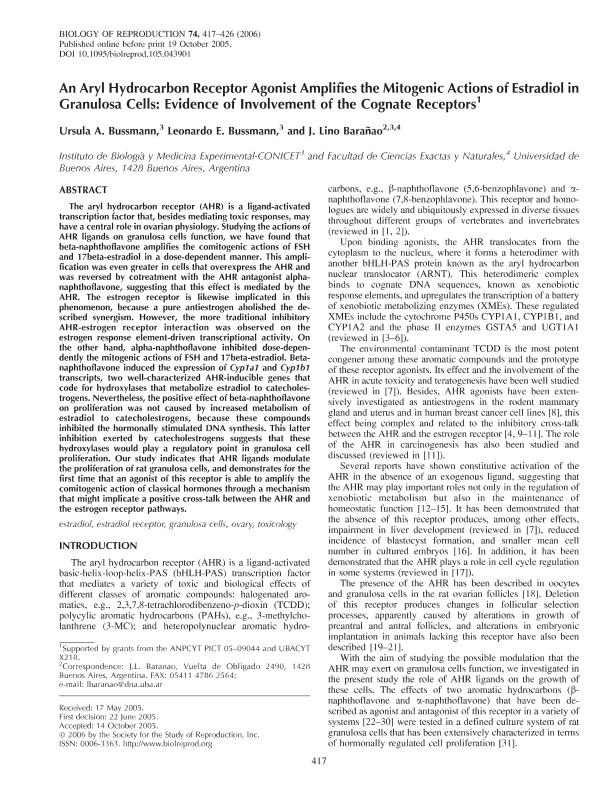Artículo
An aryl hydrocarbon receptor agonist amplifies the mitogenic actions of estradiol in granulosa cells: evidence of involvement of the cognate receptors
Fecha de publicación:
02/2006
Editorial:
Society for the Study of Reproduction
Revista:
Biology of Reproduction
ISSN:
0006-3363
Idioma:
Inglés
Tipo de recurso:
Artículo publicado
Clasificación temática:
Resumen
The aryl hydrocarbon receptor (AHR) is a ligand-activated transcription factor that, besides mediating toxic responses, may have a central role in ovarian physiology. Studying the actions of AHR ligands on granulosa cells function, we have found that beta-naphthoflavone amplifies the comitogenic actions of FSH and 17beta-estradiol in a dose-dependent manner. This amplification was even greater in cells that overexpress the AHR and was reversed by cotreatment with the AHR antagonist alpha-naphthoflavone, suggesting that this effect is mediated by the AHR. The estrogen receptor is likewise implicated in this phenomenon, because a pure antiestrogen abolished the described synergism. However, the more traditional inhibitory AHR-estrogen receptor interaction was observed on the estrogen response element-driven transcriptional activity. On the other hand, alpha-naphthoflavone inhibited dose-dependently the mitogenic actions of FSH and 17beta-estradiol. Beta-naphthoflavone induced the expression of Cyp1a1 and Cyp1b1 transcripts, two well-characterized AHR-inducible genes that code for hydroxylases that metabolize estradiol to catecholestrogens. Nevertheless, the positive effect of beta-naphthoflavone on proliferation was not caused by increased metabolism of estradiol to catecholestrogens, because these compounds inhibited the hormonally stimulated DNA synthesis. This latter inhibition exerted by catecholestrogens suggests that these hydroxylases would play a regulatory point in granulosa cell proliferation. Our study indicates that AHR ligands modulate the proliferation of rat granulosa cells, and demonstrates for the first time that an agonist of this receptor is able to amplify the comitogenic action of classical hormones through a mechanism that might implicate a positive cross-talk between the AHR and the estrogen receptor pathways.
Archivos asociados
Licencia
Identificadores
Colecciones
Articulos(IBYME)
Articulos de INST.DE BIOLOGIA Y MEDICINA EXPERIMENTAL (I)
Articulos de INST.DE BIOLOGIA Y MEDICINA EXPERIMENTAL (I)
Citación
Bussmann, Ursula Agnes; Bussmann, Leonardo Edmundo; Barañao, Jose Lino Salvador; An aryl hydrocarbon receptor agonist amplifies the mitogenic actions of estradiol in granulosa cells: evidence of involvement of the cognate receptors; Society for the Study of Reproduction; Biology of Reproduction; 74; 2; 2-2006; 417-426
Compartir
Altmétricas




